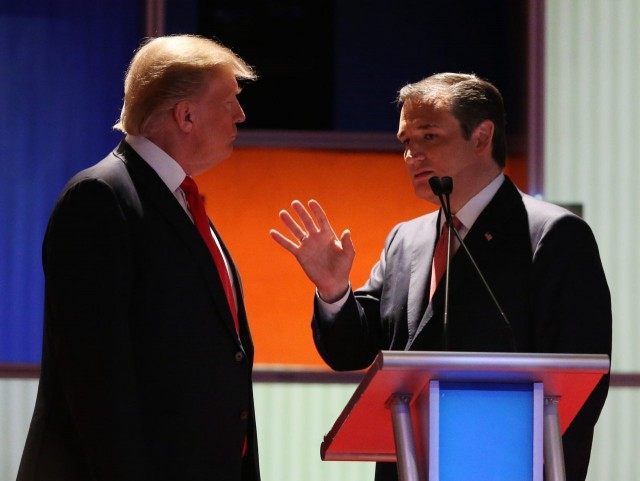As the race for Iowa has heated up in recent weeks, supporters of Republican frontrunners Donald Trump and Sen. Ted Cruz (R-TX) have traded accusations of antisemitism.
There are only about 6,000 Jews in Iowa, some 0.2% of the population, so this is not about appealing directly to the electorate. Rather, each side is trying to “John Birch” the other–make them appear morally deficient, dangerous to conservatives, and unelectable by the general public.
The feud started in a serious way with Ted Cruz’s attack on Donald Trump’s “New York values.” I personally found the phrase unseemly–not because it had anything to do with Jews, but because I dislike it when any candidate tries to divide the country. It reminded me of Barack Obama’s lament over “bitter clingers” in 2008, Dan Quayle’s attack on the “cultural elite” in 1992, or Sarah Palin’s description of more “pro-America” parts of the country in 2008.
I never considered the remark antisemitic–partly because I have met Cruz several times at meetings with Jewish supporters, whether on-the-record speeches at the Republican Jewish Coalition or off-the-record discussions with donors.
Yet after Cruz repeated the attack in the last GOP debate, adding that New York values “focus around money and the media,” I received a concerned email from a friend asking whether Cruz was attacking Jews.
The answer, as far as I can tell, is no. Nor is this a kind of “dog whistle”–a way to appeal to voters who understand and respond antisemitic cues that the rest of us, Jewish and otherwise, might miss.
I think it is simply the result of Cruz sticking to a flawed attack line long after it flops in order to avoid backing down in a face-off with Trump–and filling the emptiness of that line, in Trump-esque fashion, with whatever associations come to mind in the moment.
The accusations against Trump amount to guilt-by-association–i.e. noting that there are white supremacists who have crawled out from under their rocks to support him. This attack has been driven by the mainstream media, but has lately been echoed by Cruz supporters like Glenn Beck, who have suggested Trump is somehow linked to a disgusting attack by a hate site on Mark Levin and other Jews who have dared to criticize Trump’s recent tactics.
It strains credulity to think that Trump is behind any of this or approves of any of it. This is a man whose daughter Ivanka–a visible figure in his campaign–converted to Judaism through the Orthodox rabbinate and observes the Jewish Sabbath. Also, while Trump stumbled over policy details at the Republican Jewish Coalition forum in December, he recently pledged to move the U.S. embassy to Jerusalem from Tel Aviv if elected. Hardly a hater.
Another basis cited for the charge is that Trump’s attack on Cruz’s Canadian birth, and his comments on Mexican and Muslim immigrants, evoke an ugly kind of nationalism, or a xenophobia, that elicits other kinds of prejudice.
That is a fair criticism of Trump’s tactics, but a flimsy way to link him to antisemitism. One could do the same with Bernie Sanders’s and Hillary Clinton’s attacks on Wall Street–which are fair game, even if antisemites do the same.
A better test of whether a politician is actually using antisemitism is when he or she is well aware that certain tactics are seen as such, and persists anyway–as in Barack Obama’s repeated attacks on “the money” and “the lobbyists” in pushing the Iran deal. Nothing like that is happening between Cruz and Trump.
The small comfort Republicans can take from this unfortunate dispute is that it shows today’s GOP takes attacks on Jews more seriously than does its rival.

COMMENTS
Please let us know if you're having issues with commenting.